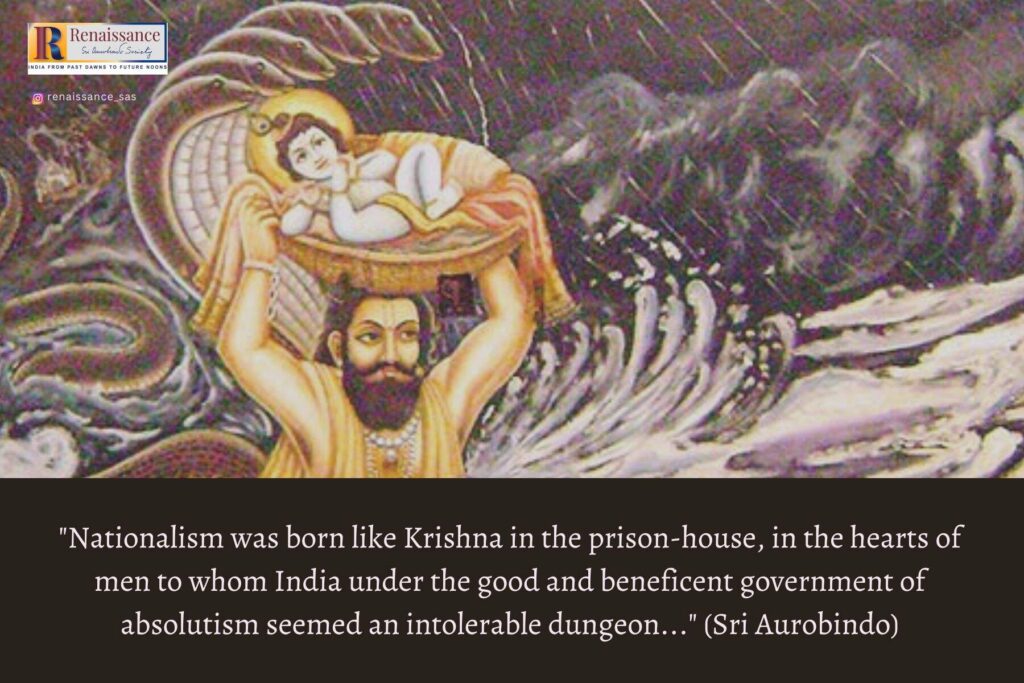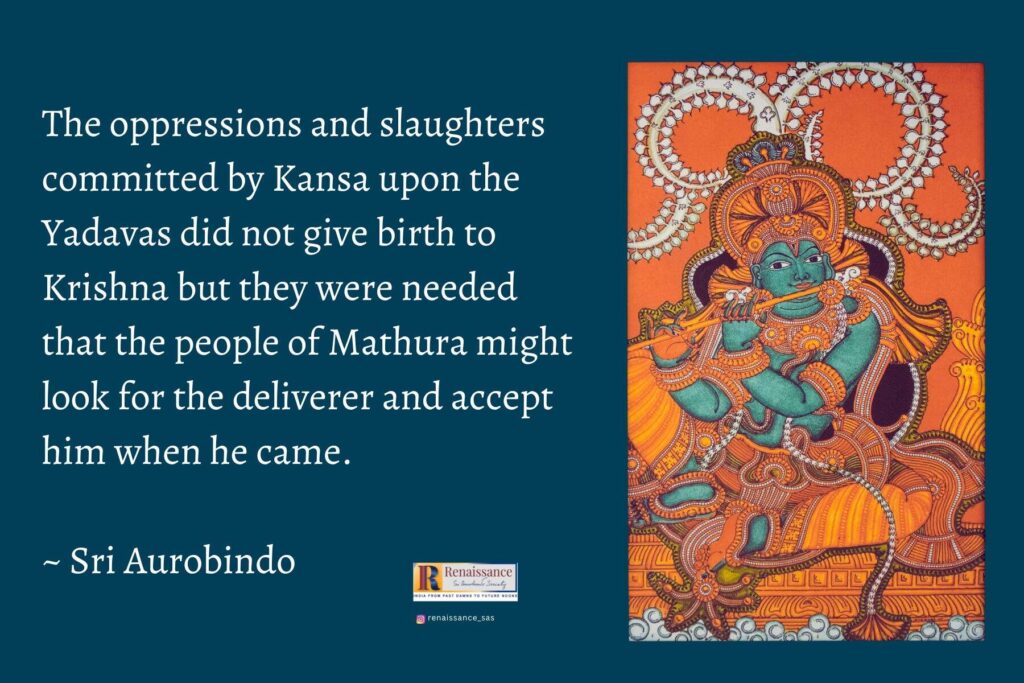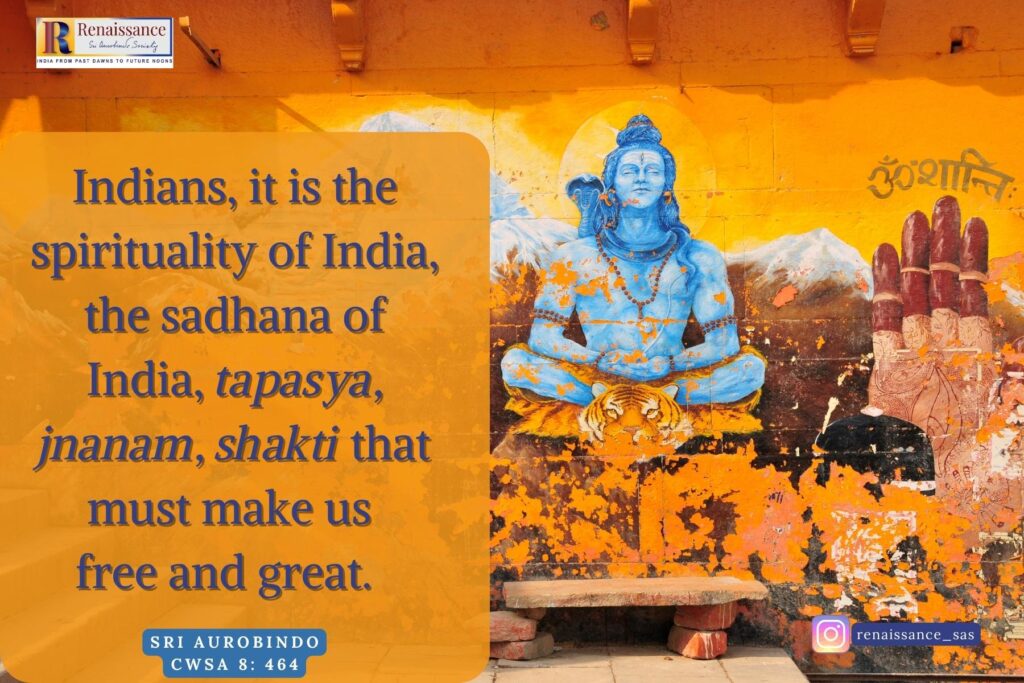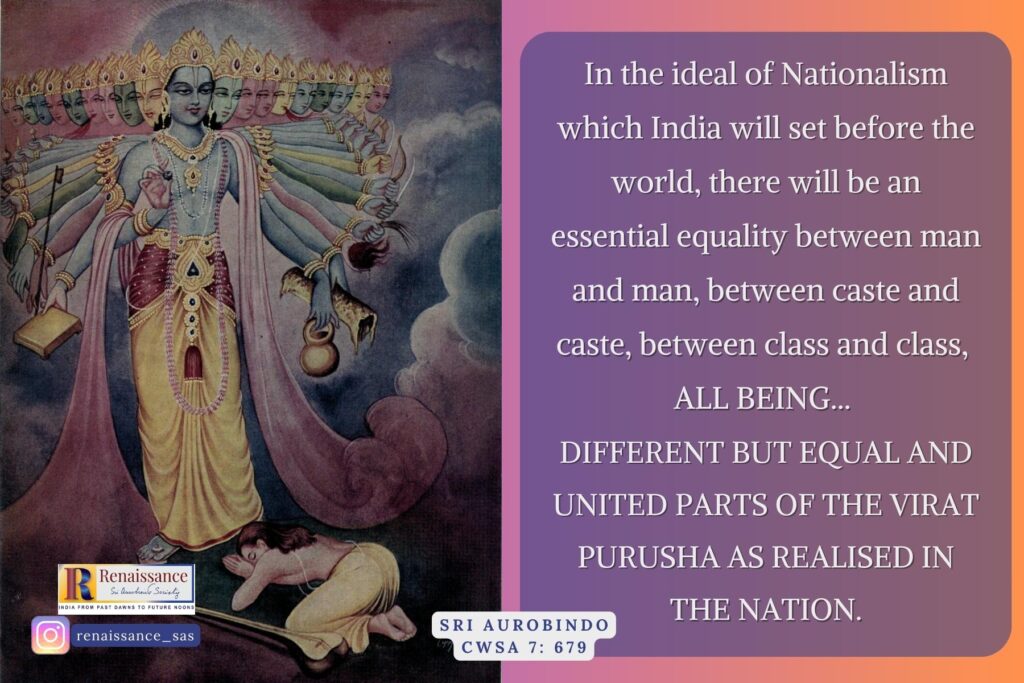Editor’s Note: What really is Indian nationalism and what was the seed of Indian nationalism?
Reading through the pages of Bande Mataram and Karmayogin we are reminded of Sri Aurobindo’s emphasis on the psychological rather than the physical principle as the foundation of nationality. Nationhood, according to him, refers primarily to the notion of psychological unity which, in turn, might be heightened by common collective memories of ancient traditions, past heroes and sufferings, by common geographical habitation and by common interests and values. It was this view of nation which made him speak of nationalism as “the passionate aspiration for the realisation of that Divine Unity in the nation, a unity in which all the component individuals, however various and apparently unequal their functions as political, social or economic factors, are yet really and fundamentally one and equal.” (CWSA, Vol. 7, p. 679).
In many of his political speeches and writings Sri Aurobindo spoke of spiritual nationalism. But there is one writing dated 16th November 1907, in which we find an enthralling explanation of the sacred origins of Indian nationalism, and the conditions in which it grew. The essay opens with a deep insight into how great ideas and movements develop and grow over time, which makes it highly significant for our times, more than 113 years later.
Don’t miss:
Nation and Nationalism – Sri Aurobindo in Bande Mataram
We are once again witnessing a scene where the existing ‘elitist’ section of the Indian intelligentsia and other politically and economically rising classes who have for long been entrenched beneficiaries of a certain ‘Idea of India’ are feeling threatened by a new churning that is taking place in India for the past decade or so. Until recently theirs have been the loudest voices in some of our university campuses, TV studios and social media.
Lately they have been also looking a bit sceptically, even cynically, at the idea of nationalism or love for one’s nation, which they see as an attitude that is parochial, narrow, chauvinistic and even conservative. Some of these ‘global’ citizens even go to the extent of using the word “zealot” in all its negative connotation to speak of those who consider themselves ‘nationalists.’
The new churning has brought to the forefront several articulate and strong voices which not only question the hitherto imposed ‘Idea of India’, but they also challenge the status quo and ask – is it possible to have a different ‘Idea of India’, one that is more authentically grounded in the eternal spirit of India? What would Indian nationalism mean with this new idea?
These new voices may carry their own ideological prejudices and other limitations, yet the churning is important because only through this process a new insight will reveal itself in time, and the nation will arrive at a new sense of internal harmony.
Reflecting on Sri Aurobindo’s essay titled ‘The Life of Nationalism’ we can’t help but notice many parallels. It becomes highly relevant when we consider the ongoing churning which is leading more and more Indians to rediscover the meaning of Indian nationalism and its continued relevance for present times and the times to come.
But there is one more reason to feature this writing. This month sees several celebrations – birthday of Sri Aurobindo, the yogi revolutionary who was the first to demand complete independence from the foreign rule, anniversary of India’s independence, and the day marking the avataran of Sri Krishna. The essay presented here is remarkable in that it helps us connect the birth and rise of Indian nationalism with the advent and work of the avatar, Sri Krishna.
We present here the bulk of the original essay and have removed only a few minor references which alluded to the contemporary policies of the British government in 1900s.
~ Beloo Mehra



The Life of Nationalism
Sri Aurobindo
For all great movements, for all ideas that have a destiny before them, there are four seasons of life-development.
There is first a season of secret or quasi-secret growth when the world knows nothing of this momentous birth which time has engendered, when the peoples of the earth persist in the old order of things with the settled conviction that that order has yet many centuries of life before it, when Krishna is growing from infancy to youth in Gokul among the obscure and the despised and the weak ones of the earth and Kansa knows not his enemy and, however he may be troubled by vague apprehensions and old prophecies and new presentiments, yet on the whole comforts himself with the thought of his great and invincible power and his mighty allies and by long impunity has almost come to think himself immortal.
Then there comes the leaping of the great name to light, the sudden coming from Gokul to Mathura, the amazement, alarm and fury of the doomed powers and greatnesses, the delight of the oppressed who waited for a deliverer, the guile and violence of the tyrant and his frantic attempts to reverse the decrees of fate and slay the young deity,—as if that godhead could pass from the world with its work undone.
This is the second period, of emergence, of the struggle of the idea to live, of furious persecution, of miraculous persistence and survival, when the old world looks with alarm and horror on this new and portentous force, and in the midst of wild worship and enthusiasm, of fierce hatred and frantic persecution, of bitter denunciation and angry disparagement, assisted by its friends, still better assisted by its foes, the new idea, fed with the blood of its children, thriving on torture, magnified by martyrdom, aggrandized by defeat, increases and lifts its head higher and higher into the heavens and spreads its arms wider and wider to embrace the earth until the world is full of its indomitable presence and loud with the clamour of its million voices and powers and dominations are crushed between its fingers or hasten to make peace and compromise with it that they may be allowed to live.
That is its third period, the season of triumph when the tyrant meets face to face the man of his own blood and sprung from seed of his own fostering who is to destroy him, and in the moment when he thinks to slay his enemy feels the grasp of the avenger on his hair and the sword of doom in his heart.
Last is the season of rule and fulfilment, the life of Krishna at Dwaraka, when the victorious idea lives out its potent and unhindered existence, works its will with a world which has become in its hands as clay in the hands of the potter, creates what it has to create, teaches what it has to teach, until its own time comes and with the arrow of Age, the hunter, in its heel it gives up its body and returns to the great source of all power and energy from which it came.
But in its second period, the season of ordeal and persecution, only the children of grace for whom the gospel is preached are able to see that vision of its glory. The world admires and hates and doubts, but will not believe. The enemies of the idea have sworn to give it short shrift. They promulgate an ordinance to the effect that it shall not dare to live, and pass a law that it shall be dumb on pain of imprisonment and death, and add a byelaw that whoever has power and authority in any part of the land shall seek out the first-born and the young children of the idea and put them to the sword.
Don’t miss:
Hymn to India
As in the early days of the Christian Church, so always zealous persecutors carry on an inquisition in house and school and market to know who favour the new doctrine; they “breathe out threatenings and slaughters against the disciples of the Lord” and “make havoc of the Church, entering into every house, and haling men and women commit them to prison”. The instruments of death are furbished up, the rack and thumbscrew and old engines of torture which had been rusting in the lumber-room of the past are brought out, and the gallows is made ready and the scaffold raised.
Even of the nation to which the gospel is preached, the rich men and the high-priests and pundits and people of weight and authority receive its doctrine with anger, fear and contempt;—anger, because it threatens their position of comfortable authority amongst men; fear, because they see it grow with an inexplicable portentous rapidity and know that its advent means a time of upheaval, turmoil and bloodshed very disturbing to the digestions, property and peace of mind of the wealthy and “enlightened few”; contempt, because its enthusiasms are unintelligible to their worldly wisdom, its gigantic promises incredible to their cautious scepticism and its inspired teachings an offence and a scandal to their narrow systems of expediency and pedantic wisdom of the schools.
They condemn it, therefore, as a violent and pernicious madness, belittle it as a troublesome but insignificant sect, get their learned men to argue it or their jesters to ridicule it out of existence, or even accuse its apostles before the tribunal of alien rulers, . . .
But in spite of all and largely because of all the persecution, denunciation and disparagement the idea gathers strength and increases; there are strange and great conversions, baptisms of whole multitudes and eager embracings of martyrdom, and the reasonings of the wise and learned are no more heeded and the prisons of the ruler overflow to no purpose and the gallows bears its ghastly burden fruitlessly and the sword of the powerful drips blood in vain.
For the idea is God’s deputy and life and death, victory and defeat, joy and suffering have become its servants and cannot help ministering to its divine purpose.
The idea of Indian Nationalism is in the second season of its life history. . . . Nationalism was not born of persecution and cannot be killed by the cessation of persecution. . . . Nationalism was already born and a slowly-growing force. It was not born and did not grow in the Congress Pandal, nor in the Bombay Presidency Association, nor in the councils of the wise economists and learned reformers, . . . nor under the hat and coat of the denationalised ape of English speech and manners.

It was born like Krishna in the prison-house, in the hearts of men to whom India under the good and beneficent government of absolutism seemed an intolerable dungeon, to whom the blessings of an alien despotic rule were hardly more acceptable than the plagues of Egypt, who regarded the comfort, safety and ease of the Pax Britannica,—an ease and safety not earned by our own efforts and vigilance but purchased by the slow loss of every element of manhood and every field of independent activity among us,—as more fatal to the life of the people than the poosta of the Moguls, . . . who looked beyond the temporary ease and opportunities of a few merchants, clerks and successful professional men to the lasting pauperism and degradation of a great and ancient people.
And Nationalism grew as Krishna grew who ripened to strength and knowledge, not in the courts of princes and the schools of the Brahmins but in the obscure and despised homes of the poor and ignorant.
In the cave of the Sannyasin, under the garb of the Fakir, in the hearts of young men and boys many of whom could not speak a word of English but all of whom could work and dare and sacrifice for the Mother, in the life of men of education and parts who had received the mantra and put from them the desire of wealth and honours to teach and labour so that the good religion might spread, there Nationalism grew slowly to its strength, unheeded and unnoticed, until in its good time it… spread over the country, gathering in every place the few who were capable of the vision and waiting for the time that would surely come when oppression would begin in earnest and the people look round them for some way of deliverance.

. . . Oppression was. . . inevitable, and oppression was necessary that the people as a whole might be disposed to accept Nationalism, but Nationalism was not born of oppression. The oppressions and slaughters committed by Kansa upon the Yadavas did not give birth to Krishna but they were needed that the people of Mathura might look for the deliverer and accept him when he came. To hope that conciliation will kill Nationalism is to mistake entirely the birth, nature and workings of the new force. . .
Nationalism has never been killed by conciliation; concessions it will only take as new weapons in its fight for complete victory and unabridged dominion. We desire our countrymen on their side to cultivate a corresponding instinct and cherish an invincible faith. There are some who fear that conciliation or policy may unstring the new movement and others who fear that persecution may crush it. Let them have a robuster faith in the destinies of their race.
As neither the milk of Putana nor the hoofs of the demon could destroy the infant Krishna, so [nothing] could check the growth of Nationalism while yet it was an indistinct force; and as neither Kansa’s wiles nor his vishakanyas nor his mad elephants nor his wrestlers could kill Krishna revealed in Mathura, so [nothing] can slay Nationalism now that it has entered the arena.
Nationalism is an avatara and cannot be slain. Nationalism is a divinely appointed shakti of the Eternal and must do its God-given work before it returns to the bosom of the Universal Energy from which it came.
~ Sri Aurobindo
~ CWSA, Vol. 7, pp. 744-750

Also see:
O Our Mother – Invocation by the Mother

~ Design: Beloo Mehra



